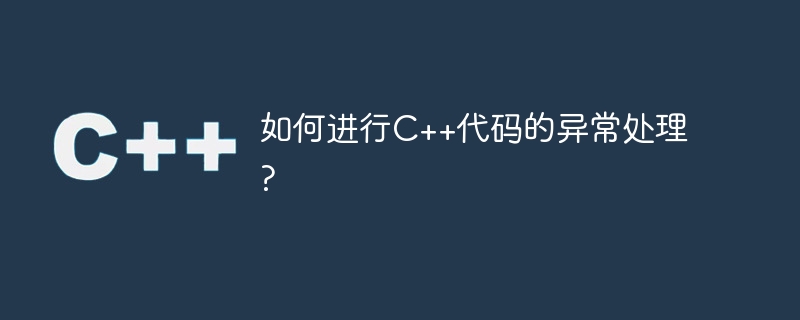Home >Backend Development >C++ >How to handle exceptions in C++ code?
How to handle exceptions in C++ code?
- 王林Original
- 2023-11-02 18:30:25858browse

How to handle exceptions in C code?
Introduction:
Exception handling is a very important part when writing C code. Exception handling mechanism can help us catch and handle errors while the program is running. In this article, we will discuss some important concepts and techniques on how to do exception handling in C.
1. Basic concepts of exception handling
Exception handling is a mechanism for handling errors when the program is running. It can help us handle errors gracefully and avoid program crash and termination. In C, exception handling is by placing the code that may cause errors in a try block and using a catch block to catch and handle it.
2. Exception type
In C, exceptions can be any type of object. Normally, we use exception classes to represent different exception types. The C standard library already provides some commonly used exception classes, such as std::exception. We can also customize exception classes to represent specific exception types to better organize and handle exceptions.
3. Try-catch block
When writing code, we can put code that may throw exceptions in a try block. If an exception occurs in the try block, the program will immediately jump to the corresponding catch block for processing.
try {
// Code that may throw an exception
} catch (ExceptionType e) {
//Exception handling code
}
In the catch block , we can use different ExceptionType to catch different types of exceptions. If an exception of the specified type occurs in the try block, the program will jump to the corresponding catch block to execute the exception handling code.
4. Exception transfer
Exceptions can be transferred between different levels of the program. When an exception in a function is not caught and handled, it is passed to the place where the function is called until a catch block is found that can handle the exception.
In the function declaration, we can use the throw keyword to specify the types of exceptions that the function may throw. This allows the place where the function is called to handle exceptions as needed, or pass the exception on to higher-level code for handling.
void myFunction() throw(ExceptionType) {
// Code that may throw exceptions
}
When calling a function, we can use a try-catch block to catch it and handle exceptions that may be thrown by the function.
try {
myFunction();
} catch (ExceptionType e) {
//Exception handling code
}
5. Exception handling strategy
When writing exception handling code, we can adopt different processing strategies according to actual needs. A common strategy is to output error information in a catch block and pass the exception to the upper code. This can make program debugging and error location more convenient.
try {
// Code that may throw exceptions
} catch (ExceptionType e) {
std::cout throw e;
}
Another strategy is to handle exceptions in a catch block and return an appropriate value. This allows the program to continue executing instead of terminating.
try {
// Code that may throw exceptions
} catch (ExceptionType e) {
std::cout return defaultValue;
}
6. Avoid excessive use of exception handling
Exception handling is a powerful error handling mechanism , but if overused, it may cause program performance to degrade. When writing code, you should be clear about when to use exception handling and when to use other methods to handle errors.
7. Summary
Exception handling is an important part of C programming and can help us handle errors gracefully. By using try-catch blocks, we can catch and handle exceptions that may occur. It is necessary to choose an appropriate exception handling strategy based on actual needs to avoid excessive use of exception handling. I believe that by understanding the basic concepts and techniques introduced in this article, you have a deeper understanding of exception handling in C code.
Reference materials:
- C exception handling, http://www.runoob.com/cplusplus/cpp-exceptions-handling.html
- C exception handling , "C Primer Plus" Sixth Edition, Stephen Prata, Machinery Industry Press, 2012.
- Exception handling in C, https://www.geeksforgeeks.org/exception-handling-c/
- C Exception handling, https://zh.cppreference.com/w/cpp /language/exceptions
The above is the detailed content of How to handle exceptions in C++ code?. For more information, please follow other related articles on the PHP Chinese website!
Related articles
See more- Exception handling content of TokenMismatchException in laravel framework
- 6 easy-to-use and free code editors recommended for download
- What errors does php exception handling catch?
- Solve the problem that vscode cannot find the c++ header file under windows
- Discuss PHP's error and exception handling mechanisms

